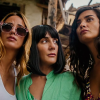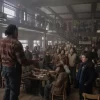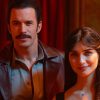Confira, com exclusividade, a entrevista da atriz para a redação do Entretetizei
To read this interview in English click here
35 anos depois do lançamento de Karate Kid 2, os fãs da franquia foram presenteados, na terceira temporada de Cobra Kai, com o reencontro entre os personagens Daniel LaRusso (Ralph Macchio) e Kumiko (Tamlyn Tomita). A exemplo das demais aparições especiais proporcionadas pela série, o momento trouxe emoções e reflexões à tona sobre o desenrolar de amores, da vida e, principalmente, do tempo. E foi sobre o tão esperado reencontro que o Entretetizei conversou com a magnífica Tamlyn Tomita: atriz que deu vida à personagem de raízes japonesas.

Sucesso entre o público e a crítica, Cobra Kai é uma série derivada da franquia de Karate Kid que acompanha Johnny Lawrence (William Zabka) e Daniel LaRusso mais de três décadas depois dos eventos do primeiro filme. Já adultos e com filhos, eles se vêem diante de dilemas do passado para os quais ainda não obtiveram resposta e, sobretudo, frente a frente com a difícil tarefa de tornarem-se seus próprios mestres na busca pelo equilíbrio. A produção já recebeu duas indicações ao Emmy e, acredite, é merecedora do reconhecimento.
Ponte entre passado e presente, Cobra Kai frequentemente proporciona o retorno de personagens queridos da franquia de Karate Kid. Aconteceu na primeira temporada, com John Kreese (Martin Kove); na segunda, com o retorno dos colegas da época de escola de Johnny; e na terceira, com a volta de Ali, Kumiko e Chozen. Emocionante e altamente esperada, a volta de Kumiko representou o retorno de Daniel a Okinawa e sua reconexão com sua paz interior, suas raízes e os ensinamentos do senhor Miyagi.
Confira, a seguir, nosso inspirador bate-papo com a atriz Tamlyn Tomita, protagonista de um dos mais bonitos e emocionantes momentos de Cobra Kai até agora.
Para começar, eu gostaria de saber há quanto tempo você já não via o elenco de Karate Kid 2? Você trabalhou com o Yuji (Chozen) em Awesome Asian Bad Guys. E com relação ao Ralph Macchio e a Traci Toguchi, que interpretou a Yuna no filme, já fazia muito tempo? Como foi reencontrá-los?
A Traci é do Havaí e acho que a última vez em que nos vimos foi há cinco anos, no Hawaii Film Festival. Nós tentamos sempre manter contato. Tenho o telefone dela salvo, então se ela estiver em LA ou eu for ao Havaí a passeio, nós sempre damos um jeito de ao menos dar um “oi”. Já com relação ao Ralph, eu acho que a última vez em que nos vimos, antes de filmarmos Cobra Kai, foi em 2017, um pouco antes do John Avildsen, diretor de Karate Kid e Karate Kid 2, realizar um festival de filmes aqui em Santa Bárbara. Foi uma retrospectiva dos filmes dele. Temos que lembrar também que houve uma exibição nos 30 anos de Karate Kid. Nós não nos vemos com tanta frequência, mas o coração está sempre lá. É inacreditável pensar que já se passaram 35 anos, mas é sempre muito divertido. Nunca há tempo suficiente para nos atualizarmos em tudo que aconteceu, mas há sempre amor envolvido.

Li algumas das suas entrevistas recentes e fiquei surpresa em saber que as suas cenas com o Ralph em Cobra Kai não foram gravadas no Japão, e sim na Geórgia. No episódio em que o Daniel volta a Okinawa ele fala sobre o quão surpreso ficou em ver o quanto a cidade tinha mudado, então eu gostaria que você fizesse o caminho oposto e me contasse quais aspectos sobre Okinawa permanecem os mesmos de 35 anos atrás. Pode ser sobre as pessoas ou tradições de lá. O que mantém viva a essência de Okinawa?
Okinawa é o Havaí da América. O Japão é esse país grande e Okinawa é uma pequena ilha tropical e muito especial onde faz muito calor e as pessoas têm amor no coração. É sobre encontrar o equilíbrio entre você, sua família e sua comunidade. Foi sempre assim lá. Trata-se da filosofia do Ikigai, e Okinawa pratica isso. É a unificação entre você, seu trabalho e a sua comunidade, e deveria haver um equilíbrio entre esses três mundos. Nós estamos sempre discutindo as diferenças entre a cidade e o interior, e acho que Okinawa mantém a mesma simplicidade de 35 anos atrás. Ela agora tem Starbucks, McDonald’s e KFC, mas nós estamos tentando obter o melhor dos dois mundos e isso acontece com qualquer país que tenta progredir. Nós tentamos manter o que é vital e eu tenho orgulho em dizer que na última vez em que visitei Okinawa ela ainda era a mesma. Minha família está lá. Eles amam a conveniência do Starbucks, mas quando estão em casa o que eles preparam é o ocha (chá).
Você mencionou sua família morando em Okinawa. Fiquei muito feliz em saber que a partir de Cobra Kai você foi capaz de dar ao público uma representação mais fiel da cultura japonesa, mesmo que a partir de simples detalhes, como os passos de dança. Você esteve de volta à cidade para aprendê-los? Quais foram os pontos altos da experiência?
Os três roteiristas de Cobra Kai, Josh Heald, Jon Hurwitz e Hayden Schlossberg, são melhores amigos desde os tempos de escola. Eles se tornaram roteiristas em Hollywood e, por amarem o universo de Karate Kid, eles são capazes de construir a série de uma forma muito completa. E aí, quando eles me chamaram para participar de Cobra Kai, dois anos atrás, eu olhei para o script e falei: pessoal, por favor, me deixem passar uma imagem mais autêntica de Okinawa, incorporar palavras em Okinawan e não só em Japonês. Eles deram o sinal verde e aí eu fui até a Associação de Okinawa na América, aqui em Los Angeles, e lhes pedi ajuda. Eles me deram a música, me ensinaram alguns passos de dança, que são diferentes dos japoneses, e me ensinaram algumas palavras em Okinawan. Levei para o set o kimono da minha mãe e alguns itens de decoração porque eu sabia que era a minha responsabilidade levar o máximo de Okinawa à Geórgia, que era onde estávamos filmando.

O episódio em que o Daniel reencontra a Kumiko foi um dos mais bonitos e emocionantes na série até agora, porque representou a volta dele às origens e às lições de vida que o Sr. Miyagi o havia ensinado. E, de certa forma, foi o mesmo processo pelo qual a Kumiko passou, já que, depois de viajar pelo mundo como dançarina, ela voltou para casa. Qual é o principal ensinamento sobre “pertencer” que você acredita que a franquia tenha a oferecer?
É sobre pertencimento, família e equilíbrio. Acho que é isso que o Sr. Miyagi falou nos filmes originais de Karate Kid: a vida é sobre equilíbrio. É o equilíbrio que nós buscamos como indivíduos, com nossas famílias. É sobre uma nova geração aprendendo com o que os mais velhos têm a oferecer. Mesmo que nós estejamos nos nossos 20 anos, achando que conhecemos o mundo, ainda há um universo de experiências que ainda não vivenciamos e que vamos aprender com nossos pais, nossos avós. E foi por isso que o Ralph Macchio não disse “sim” a uma sequência de Karate Kid até 35 anos depois. Ele não quis desenvolver nenhum projeto relacionado ao universo de Karate Kid que não tivesse o espírito do Sr. Miyagi, de Okinawa, a conexão com o equilíbrio. E esse equilíbrio não vai ser nunca estável, ele vai vir em ondas, mas contato que você saiba surfar essas ondas, está tudo bem. É isso que eu encontro na cultura de Okinawa. Eles passaram por tanta pobreza e destruição na época da guerra, mas ainda assim se reergueram. As próprias origens do karatê. Você vê que os fundadores não tinham armas. Eles só tinham as próprias mãos para se defender e, ainda assim, eram capazes de lutar contra o mal e contra aquilo que colocava em risco o equilíbrio.

Sinto que todos nós ficamos muito comovidos ao saber que a Kumiko nunca se casou e, olhando dezenas de comentários online, eu vi que muitos fãs ainda têm esperança para que eles terminem juntos. No meu caso, o Daniel e a Kumiko me lembraram da lenda japonesa “Akai Ito”, que diz que não importa quanto tempo passe ou a distância que possa separá-los, eles estarão sempre conectados por uma corda vermelha. Você concorda com isso?
Se nós formos verdadeiramente honestos com nós mesmos, é aí que todos se lembram do seu primeiro amor. Você sempre vai tê-lo e acho que é esse o presente que temos enquanto seres humanos. Nós temos a imaginação. Temos sonhos. Desejos. E nós podemos desenvolver essas histórias nas nossas mentes e obter satisfação a partir delas. Podemos sonhar, anotá-las, transformá-las em um filme ou numa série 35 anos depois. Esse é o poder das histórias e essa lenda, da qual você falou, representa os diferentes tipos de amor que temos no mundo. Todos nós estamos conectados a alguém e é sobre isso que se trata o casamento: sobre se dedicar e se manter junto de alguém se formos sortudos o suficiente para encontrar essa pessoa.

E você acha que a Kumiko teve a conclusão que ela precisava quando ela se reencontrou com o Daniel? Eu sinto que era algo que os dois ansiavam, já que eles se perguntavam como cada um estava depois de tanto tempo. Você acha que ela disse tudo que precisava ou é melhor que algumas coisas não sejam ditas?
Às vezes é melhor viver com o que poderia ter sido na imaginação, não é? Acho que ali o presente para a Kumiko foi rever o Daniel de forma tão inesperada. É um presente pelo qual você não pede. Não é um presente de Natal, um presente de aniversário. Foi algo que, praticamente, caiu do céu, bem parecido com a primeira vez em que eles se conheceram. Poder receber não só um, mas dois presentes desse, ainda que 35 anos depois, é como: caramba, quem consegue isso? Eles foram preenchidos por uma sensação de alegria, quase que como um tesouro. É o tipo de tesouro que você não guarda numa caixa. Ele não pertence a uma prateleira e você não o usa como uma joia. Ele vive e respira dentro de você. Fico muito feliz em saber que podemos proporcionar esse momento através de Cobra Kai e que as pessoas ficaram satisfeitas com a forma como aconteceu.
Eu tenho uma pergunta com relação à cena das cartas do Sr. Miyagi. Como é feita a leitura do conteúdo? Ela acontece antes ou durante a cena para haver mais emoção? Existe algum padrão?
As cartas foram escritas em japonês, então eu tive que memorizá-las antes. Isso é algo mais técnico porque se você for ler na TV uma carta de verdade, o público perde o interesse, então eu tive que memorizar o conteúdo e interpretar como se eu estivesse lendo pela primeira vez. E essa foi uma escolha da Kumiko, a de deixar o Daniel San achar que aquela era a primeira vez em que ela lia as cartas para que eles pudessem dividir aquele momento juntos. Se você acredita em espíritos, é como se o Sr. Miyagi usasse a Kumiko para dizer ao Daniel San o quanto ele o ama, e poder ser esse canal foi muito especial. Minha luta enquanto Tamlyn foi não soar muito emotiva, porque ali havia o dobro de emoções: Tamlyn e Ralph, que sentem falta do Pat Morita, e também dos personagens, que sentem falta do Sr. Miyagi. E foi essa a beleza e a responsabilidade da cena: representá-lo com o máximo de fidelidade possível.

Na cena final da Kumiko com o Daniel, ela é muito sábia ao dizer que o que você traz ao mundo, eventualmente, vai voltar para você. Existe algum outro pensamento inspirador do dialeto de Okinawa que você queira compartilhar comigo?
A ideia de procurar alegria na vida porque há sempre o amanhã. Novamente, é o contexto histórico. Okinawa sofreu muito por causa da Segunda Guerra Mundial e, ainda assim, foi capaz de se reerguer por causa da comunidade, que deu as mãos na oração, no trabalho e na amizade. É sobre encontrar pessoas que estejam lá para você; é sobre trabalhar, dar e receber, porque isso também nos traz alegria. Até porque ela está presente nos momentos pequenos tanto quanto nos grandes. Não é exatamente um pensamento, mas é a prática que faz dele importante.
Por último, mas definitivamente não menos importante, gostaria de saber alguma lição que você tenha aprendido com a Kumiko há 35 anos e agora, porque, além da personagem ter se tornado parte de você, você se tornou uma pessoa diferente desde que começou a interpretá-la.
A ideia de que estamos todos conectados. Acho que era isso que a Kumiko estava tentando dizer. Nós estamos todos conectados e não controlamos quando nos encontraremos novamente, mas nós vamos nos rever. Realmente acredito que ela tenha sido o tipo de pessoa que viajou ao redor do mundo e disse: quantas conexões incríveis estou fazendo. Ainda vou rever vocês. Acho que isso foi parte do espírito dela e também de sua alegria. Nós estamos todos juntos, só não podemos controlar quando vamos nos rever.

Entrevista em inglês
So first of all I would like to know how long it had been since the last time you saw your co-stars from Karate Kid 2. You worked with Yuji (Chozen) in Awesome Asian Bad Guys. Now what about Ralph Macchio and Traci Toguchi, who played Yuna in the movie? Had it been a while? How did it feel like to reunite with them?
Traci is from Hawaii and I think the last time I saw her was maybe five years ago at the Hawaii Film Festival. She and I always try to get in touch. I have her phone number in my phone. We text and if she is in LA or if I go to Hawaii to visit we always try to make time to at least say hello. But Ralph and I, I think the last time we saw each other, before filming Cobra Kai, was maybe 2017, right before John Avildsen, the director for Karate Kid and Karate Kid 2 had a film festival here in Santa Barbara. It was a retrospective of his films. If not, my memories are getting together because we have to remember that there was a 30 year anniversary of Karate Kid four years ago. They had a little screening. We don’t get to see each other very often but the heart is always there. It’s unbelievable that 35 years have passed by but it’s always a joy. We catch up and there’s never enough time but there’s always the love there.
I went through some of your recent interviews and was surprised to hear that your scenes with Ralph weren’t shot in Japan but in Georgia. And in the episode in which Daniel goes back to Okinawa he talks about how surprised he was with how much things had changed so I would like you to tell me the opposite: what about Okinawa remains the same from 35 years ago. It can be about its people, its traditions. What keeps Okinawa’s essence alive?
Okinawa is the Hawaii of America. Japan is this big, long country. Okinawa is this tiny island. Very special, tropical, sunny. The people have love in their hearts. It’s all about finding the relationship with yourself, with your family and your community. That’s how it has always been there. Ikigai. Okinawa practices that. It’s the unification between yourself, your work and your community and there should be a perfect balance of those three worlds of yours. We are always discussing the differences between the city and the urban environment, but also the joy and the treasure of the country, of the simpler life. And I think Okinawa has retained that since 35 years ago. It does have Starbucks, McDonalds, Kentucky Fried Chicken but we are trying to get the best of both worlds and that’s what happens in every country as we try to progress. We try to keep what is vital, what brings life. I’m proud to say the last time I visited Okinawa it still remains the same. My family is still there. They love the convenience of Starbucks but they will sit at home and prepare ocha, the tea.
You spoke about your family living in Okinawa. I was very happy to hear that with Cobra Kai you were able to give the audience a more accurate representation of the japanese culture, even through the slightest details, such as the dance moves and did you actually go back to Okinawa to learn those moves? What were the highlights of the experience?
The three amigos, who are the writers behind the show, Josh Heald, Jon Hurwitz and Hayden Schlossbergd, are best friends since grade school. They became writers in Hollywood and since they love the Karate Kid world, they are able to make the tv series so complete. When they asked me to come into Cobra Kai, two years ago, I looked at the script and went: please, guys, I need to be able to bring a more authentic, real picture of Okinawa so can I have the permission to add Okinawan words, not just japanese ones? They said yes and I went to the Okinawan Association in America, here in Los Angeles, and asked for help. They gave me the music, the dance moves, which is different from japanese dance, a few words in Okinawan, so I was able to use those. I was also able to bring to set my mom’s kimono, little props and decoration. I knew I had that kind of responsibility to bring as much as Okinawa to Georgia, where we were shooting.
The episode in which Daniel reunites with Kumiko was one of the most beautiful and emotional ones on the show so far because it represented him getting back to his roots and to all the life lessons that Mr. Miyagi taught him. In some way, it was the same that Kumiko did after travelling the world as a dancer since she came back home. So what is the lesson on belonging that you think that the franchise has to spread?
It’s about belonging, it’s about family and it’s about balance. I think that’s what Mr. Miyagi said in the original Karate Kid movies. Your whole life is about balance. It’s about a balance between what you want as an individual but also the umbilical cord to our family and the importance of love and connection. It’s about the new generation going back to learn about what the old generation has to teach you and I think that’s what speaks to us. Even if we are in our 20s and we feel like we know the world, there’s still a world of experiences that we don’t know yet and it’s the elders that can probably teach us a lesson too and I think that’s what going back to Karate Kid so often. And I credit Ralph Macchio for that. That’s why it didn’t happen until 35 years ago that he said yes to a sequel. He was the one who demanded that he isn’t going to do anything Karate Kid related without the spirit of Mr. Miyagi, without the spirit of Okinawa, without the connection to balance. And that balance is never steady, it will always go in waves but as long as you learn how to ride the waves that’s okay. It’s the kind of balance that I find in Okinawa’s culture because it went through so much depression and poverty after the war. Also in karate, knowing the founders didn’t have weapons. They only used their hands to defend, protect and fight against evil to the life of balance and good.
I feel like we were all very touched to hear that Kumiko never got married. And going through several comments online I saw that many fans still have hope for them ending together. As for me, Daniel and Kumiko reminded me of Akai Ito, the japanese legend of fate that says that no matter how much time passes by or how far they are from each other, they will still be connected by a red string. Do you also agree with that?
If we are really honest with ourselves, everyone remembers their first love. You’ll always have that and I think that’s the gift we have as human beings. We have imagination. We have dreams. We have desires. And we can think about those stories in our heads and gain that kind of satisfaction. We can dream, we can write down these things, we can make a movie, we can shoot a TV series 35 years later. That’s the power of stories and the legend you mentioned is speaking to the truth about the different kinds of love there is in the world. I think we all have strings in our lives. It’s the one we decide to put the ring on. It’s the one we need to keep committed to and do the hard work. That’s what it is about marriage if we are lucky enough to find the love for the rest of our lives.
And do you feel like Kumiko had the closure that she needed when she reencountered with Daniel? Because it was something that I feel like both of them needed. They wondered how each other had been after that long. Do you think that she was able to say all that she wanted or some things are better left unsaid?
Of course! Sometimes it’s better to live in your imagination and in what could have been, right? It’s the gift of Kumiko seeing Daniel San, so unexpected. That’s a gift that is not asked for. It’s not a Christmas gift, it’s not a birthday gift. It was a gift that came out of the sky, much like the first time Kumiko and Danielsan met together. To have those two gifts in life, which is the same gift but after 35 years, is like: who gets that? And to be filled with that kind of joy and that kind of treasure. You can’t put that in a box. That doesn’t belong on your shelf. You don’t wear it as a piece of jewelry. It lives and breathes in your heart and how you communicate it and tell it, luckily for the story of Cobra Kai and I’m just so happy that people got that and really appreciated it.
And I have a doubt. In the scene of Mr. Miyagi’s letters, do you read the letters before shooting or do you have your first read while shooting so that there is more emotion? Is there a pattern?
The letters were written in Japanese. I don’t read Japanese so I had to memorize the letter. And this is a technical thing. When reading a letter for TV if you read a real, true letter, the audience becomes very uninterested. I had to memorize it and play it as if I was reading it for the first time. Kumiko’s choice was to let Daniel San take in everything that she is reading as if she is reading it for the first time so they can share that moment together. That’s like hearing, if you believe in spirits, the spirit of Mr. Miyagi is coming through Kumiko to tell Danielsan how much he loves him and to be that road was really special so I knew I had to take the time to read the letter. And my fight as Tamlyn was to not be so emotional because Ralph Macchio and Tamlyn Tomita miss Pat Morita so much but Kumiko and Danielsan also miss Mr. Miyagi so much so there is double amount of feelings. To get the future voice of Mr. Miyagi was through those letters and through the emotion that Kumiko/Tamlyn was getting Danielsan/Ralph and that was the beauty of it. It was our responsibility in telling that story as honestly as possible.
In Kumiko’s final scene with Daniel she is very wise herself when she says that what you put into the world will eventually come back. Are there any other inspiring quotes from the Okinawan dialect that you could share with me?
It’s about finding joy in life because there is always tomorrow. Again, this is history. Okinawa suffered a lot of tragedy in World War Two and to know that they survived with so much joy because of community. It’s about holding hands together in prayer, in work, in friendship. It’s about finding people who are there with you and it’s about finding that joy. Doing the work and fixing something or giving something and that giving and that receiving brings joy. My aunties are always trying to find that piece of joy in every little thing. The idea that joy can be found in every single small moment is as meaningful as the big moments. I know it’s not a really formal saying but it’s the practice.
Last but not least I would like to know what you have learned from Kumiko 35 years ago and now because she is also a part of you and you a different person since you started portraying her.
That we are all connected. I think that’s what Kumiko was trying to say. We are all connected and we can’t control the times that we meet each other again but we will meet each other again. I really believe that she was that kind of person who travelled around and said: these are wonderful connections I’m making and I’ll see you again. I think that was a part of her joyfulness but also her wisdom. We are really all together but we can’t control the time.
Confira a seguir o áudio oficial da entrevista:
Check out the original audio of the interview below:
Curtiu a entrevista? Fique ligado no Entretetizei, através do nosso Twitter, Insta e Face para mais notícias do entretenimento!
*Crédito da foto de destaque: Reprodução/Internet











